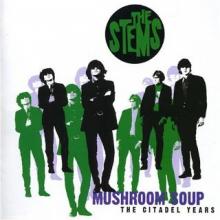Apart from that being a weird and endlessly hilarious commentary on how the dissemination of media’s changed in the last forty years, there’s really no way to figure out who did what first. It’s too much to figure that anyone involved with the Ramones or the Saints cataloged dates for initial practices or impromptu jam sessions.
So, it’s worth wondering if the Stems ever heard the Chesterfield Kings, or any other US based garage retreads, and thought that someone had ripped off their own rip off. Whatever the answer is – and it doesn’t matter – the fact that the possibility exists is enough entertainment to last for a bit.
Formed in Perth, Western Australia during 1983, the Stems constituted only a small portion of the nations burgeoning alt. music scene. That being said, a huge number of those Aussie bands concerned themselves with some sort of historical revelry. Even the better known punkers had an eye towards the UK scene as it splintered and sputtered out. Nick Cave went so far as to ditch his home for greener pastures. But that guy’s a hack and we’re now concerned with the Stems.
Distilling the bands approach is relatively simple, though. Any portion of the sixties rock scene – from any place on earth – was fair game. And while there’s usually some mention of the band’s punk affiliations, those seem minimal when contrasted with the Stems beat and mod concerns.
Issuing a single – “Make You Mine” b/w “She’s a Monster” – in 1985 didn’t put the Stems ahead of the game, but again serves to point out the revivalist concerns the band held. By this point in the eighties, New Zealand’s the Dead C and its cohort were just over the horizon line. And none of those folks had any intention of paying reverence to traditional rock stuffs.
But persisting in a climate that wasn’t exactly made for these tunes, despite the Stems relative popular successes, points to a weird Aussie trait of doing whatever seems appropriate at the time. It’d be hard to understand the Stems as an extension of Percy Grainger, but the electronic music pioneer simply set off on his own skewed journey of what he thought sound should be. It’s not good or bad. And some of it – the Stems as well – is entertaining. Garage of this strain, just isn’t a monumental achievement.
